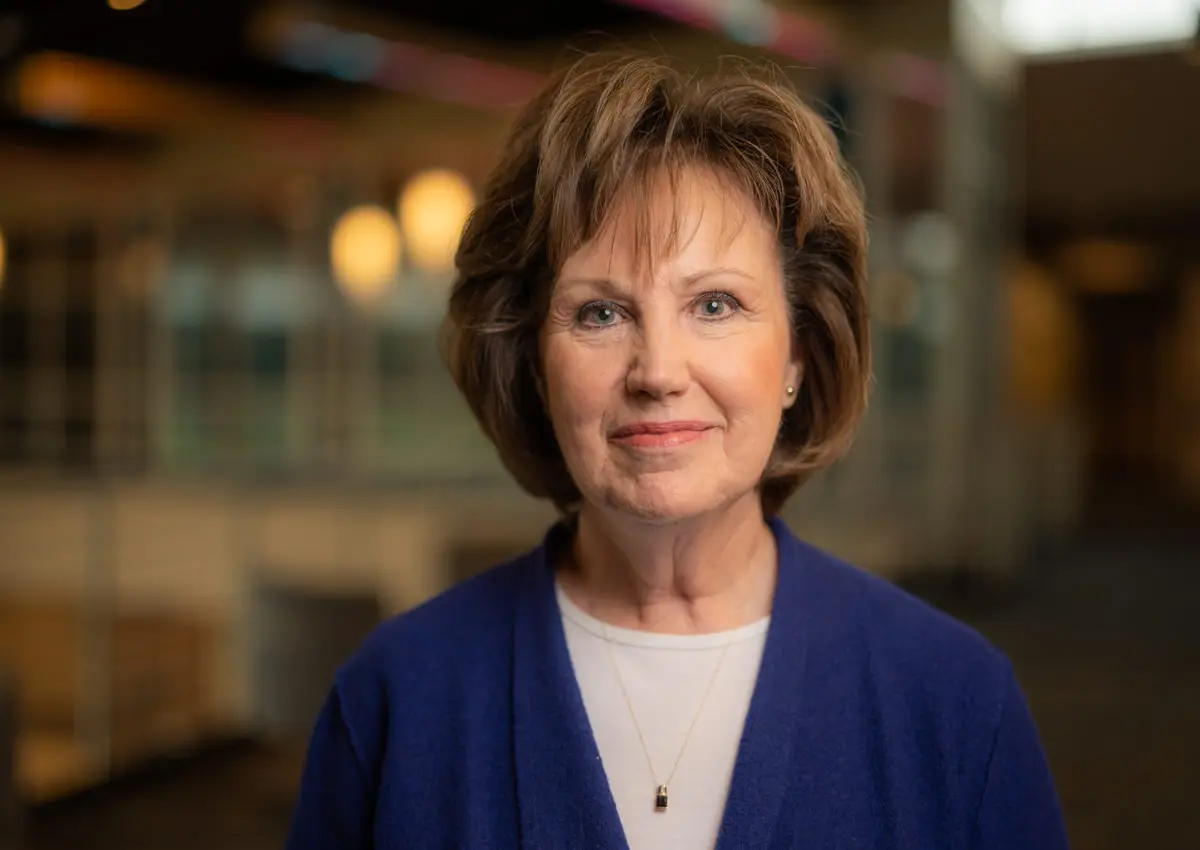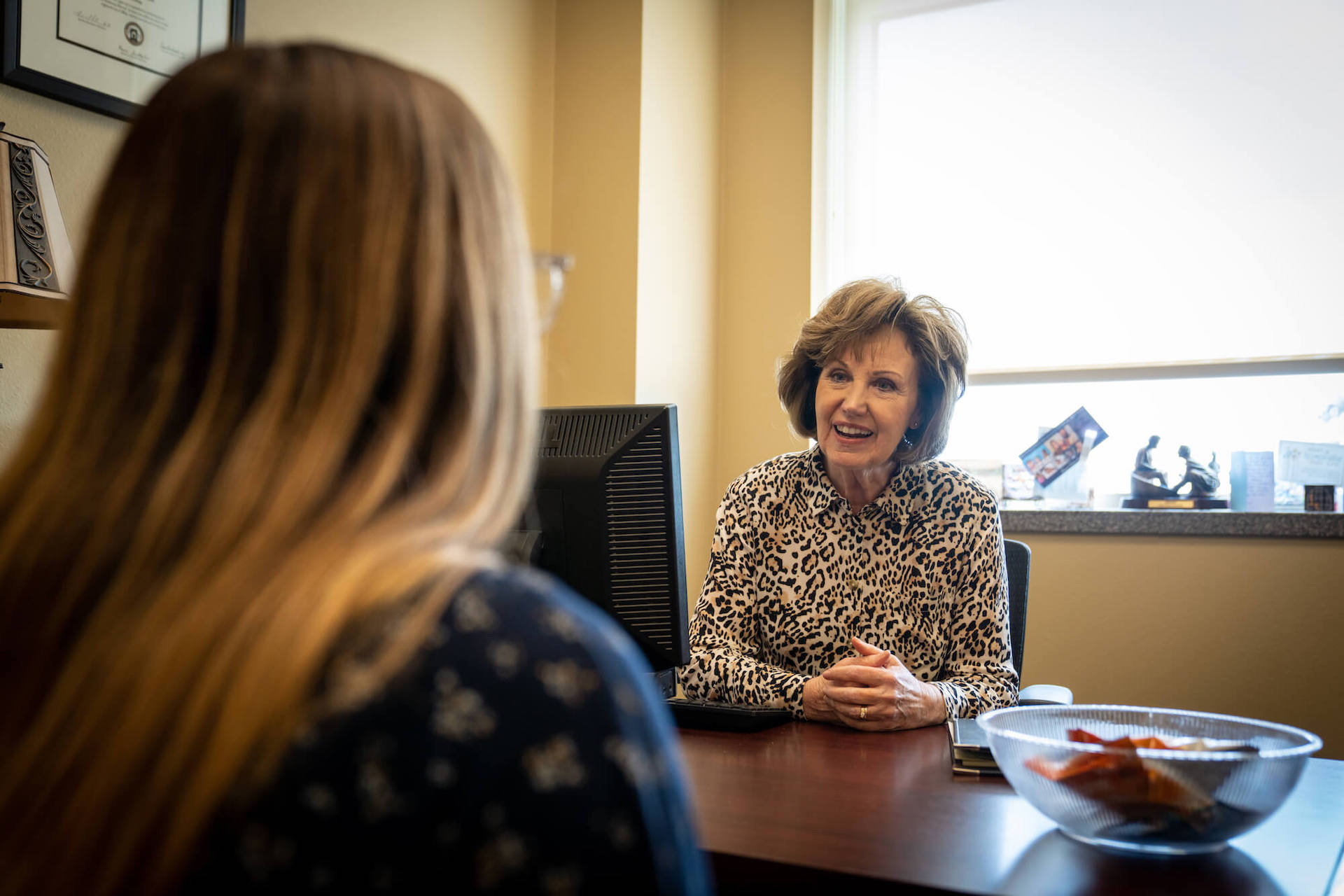 Debbie McGinness has served as the Assistant Director for Academic Support, supervising the Math Lab, Tutoring, and Supplemental Instruction (SI) programs, for the last 13 years. This spring, she retired to a part-time role as Academic Support Specialist in the Achievement Center, helping students on academic probation.
Debbie McGinness has served as the Assistant Director for Academic Support, supervising the Math Lab, Tutoring, and Supplemental Instruction (SI) programs, for the last 13 years. This spring, she retired to a part-time role as Academic Support Specialist in the Achievement Center, helping students on academic probation.
Debbie has impacted hundreds of students through her role, not to mention the impact of the supplemental instruction program (which was in its infancy when she took the job in 2009) has had on the university—a program she helped build from scratch through dedicated research and nationwide conferences on what other universities were doing. That impact is illustrated in the way multiple students and alumni describe her: caring, thoughtful, encouraging, "the greatest example I’ve seen of what servant leadership looks like." Her peers agree: she won the Gerrie Forbis Staff Excellence Award in 2019, an award whose recipients are chosen exclusively by university faculty and staff.
When you talk to Debbie about her time in this role and everything she’s seen, she exudes humility, deference, reverence for God and His work. She accomplished only what He allowed her to, what He prepared for her beforehand. It’s clear: everything she does is intertwined with Christ, and any praise given is directed towards Him and to the students who have grown and learned and changed the world around them. We sat down with her to learn more about the program. In her words:
What is Supplemental Instruction?
SI (Supplemental Instruction) is a peer-led program which provides study sessions during the week for rigorous courses. The SI leaders are students who have successfully completed a course and attend the class again as they lead, consulting closely with the professor of the course, then preparing for and leading the sessions on their own. SI provides an opportunity for students to come together to ask questions, to delve into a better understanding of the coursework, and hopefully, improve their grades. In the fall of 2022, 378 students were served through the program, consistent with the average number served in past semesters.
I believe, as Christians, that whatever we do, we should do the very best we can and for His glory. So, my goal for this program was to make it as efficient and helpful as possible. The backbone of the program is the strength of the SI leaders, so I really tried to search and find those students I felt would make a good fit and were the most qualified to teach (recommended to me by the professors and even other students). Always searching, always trying to find students who have an excellent command of the subject, good communication skills, and especially a desire to help other students—it’s a huge commitment. Over the years, many outstanding LeTourneau students have taken ownership of the position, going above and beyond what is asked of them.
Training Student Leaders
One of the key aspects of their training and one-on-one guidance is helping them know what and how to prepare for their sessions while making them as interactive as possible. So, in the training, I would show them ways to do the prep, but they do all of it on their own. Most of them are sitting through the class lectures and making notes of the key points, the most important and most difficult topics. Then, they cover those things in their sessions.
But, for problem-solving, they have to sit down and work through those problems to know what types of questions to ask students to help them walk through it. They do get guidance from the professor at times, but most of it is on them. It is not an easy role, and it is always rewarding to watch their confidence and abilities increase as they lead the sessions.
Even with the very capable students, there’s always a lot of nerves in that first session, and they are shaky at times. But, as I provide feedback—encouragement on what they are doing well and suggestions on how to improve—it’s so much fun to see in weeks two and three how confident they become in delivering their material. At the end of the semester, many of them remark on how much more confident they are taking questions in front of the group. And oftentimes, several students would say, "I really discovered how much I like teaching." God then used that opportunity to redirect their lives, which was very encouraging.
A Hopeful Ministry to Students
God confirmed over and over again, this is where I was supposed to be, this was the work I needed to be doing, and these were works He had prepared beforehand for me. As we hit different issues, I would lay those before Him and witness Him work those out. Many times, we would still be missing SI instructors for certain courses weeks after classes began. But I learned over the years that God would raise up and provide the students we needed: many of our best SI leaders were late hires, proof of His faithfulness to us.
Furthermore, working with these leaders and seeing how God was working in individual lives—through them, their service to other students, their selflessness, their commitment—has always been an inspiring faith-builder for me. We have some really amazing students at LeTourneau who are focused on Christ, and I have always been encouraged knowing these students will be leaders in their fields as they graduate and demonstrate their faith in the workplace.
I strongly believe our work is worship, and I wanted them to see that. That this wasn’t something they were doing for me, but it reflects their walk and what they're doing. This program is a ministry because it builds relationships between the SI leaders, the students, and their professors. It is a win for the students who attend, the students who lead, and the university.
The main goal is assisting students with rigorous courses so they don’t feel stuck or alone—they’re with other students in the course and led by a student who’s already gone through it, to help them walk through the difficulties, to give them insight and tips. In time, hope is born out of that process: over and over, students make comments like, "I wouldn’t have made it through the course without SI." They have a place they can go, they don’t have to spin their wheels over something they’re not understanding, and that’s the ministry here: walking with and helping each other and building that community together.
Even though some roles are not very visible, the role you play can be very impactful in the lives of others. The role of developing and nurturing others is a great journey. I may not have realized that at the beginning, but I definitely realize it now, and the impact that can have over the years.
The things that will remain with me as I leave are my SI leaders—getting to know them, watching them grow and progress. Those are the things that stand out in my memory because I’m glad I was able to be a part of that, to hopefully impact them in a positive way.
